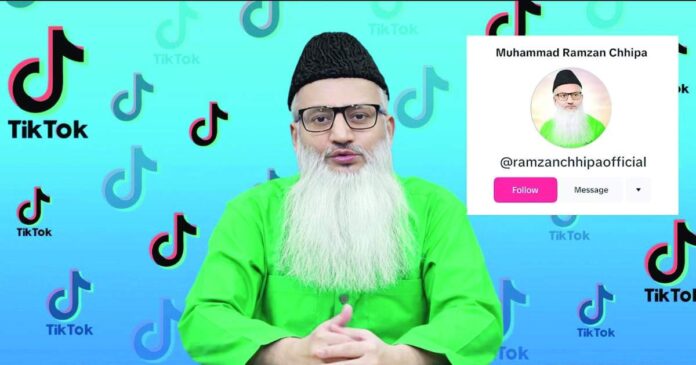Chhippa, a noble social worker of the country, once immensely respected but now is widely getting trolled by the masses.
You probably know him from his ambulances and the helpline “1020,” but Gen Z knows him as a meme. First, it was Onijah, now it’s Chhipa’s own Instagram that’s becoming the reason.
We will tell why Chhipa is getting trolled but one thing is for sure: social workers are made for social welfare and charities, not for algorithms and virality chase.
Does it count as charity when acts of generosity are deliberately captured on camera and exude ‘cringe?’
Chhipa’s Attempt at Internet Virality
When a video of veteran humanitarian Ramzan Chhipa went viral this July, the internet wasn’t sure whether to laugh, cringe, or just sigh. In the now-infamous clip, Chhipa surprises a young boy with a birthday cake at a shop.
But instead of quietly doing a good deed, he stages the moment with the precision of a film director, telling the shopkeeper, “Write on the cake that it’s from Chhipa Sahab… but don’t tell them I arranged it.” The irony was almost too perfect. It screamed performative activism, and naturally, the internet ran with it. Memes followed, and the clip spread like wildfire.
The users rushed to comment sarcastic things like “batana mat kisney cake diya hai lekin bara bara mera naam likhdo cake pe.” Some also urged Chhipa to only stick to social work as the clout chasing is clearly not for him.
Amid the jokes, more genuine reactions also followed with comments applauding his dedication, discussions on the importance of visible kindness, and appreciation for getting youth to pay attention to philanthropy. Conversation spiked not just around the cake clip, but about the Chhipa Welfare Trust itself.
In a time when Pakistan is grappling with trust issues surrounding NGOs and public figures, this kind of content doesn’t inspire faith, and it’s the last thing you would want to give to a mass audience like Gen Z that will see right through it.
View this post on Instagram
Why the Attempt at Virality Backfired?
On the surface, these series of latest Chhipa videos seem simple, an act of generosity caught on camera. But the execution was so theatrical, so drenched in awkward sincerity, that it begged the question: was this influenceristic tactic really necessary for a man as well-known as Chhipa?
And it’s not just the tone that’s off. Critics argue that these online stunts distract from the actual issues his organisation should be highlighting: poverty, access to emergency services, child abandonment, and more. The focus shifts from the work to the worker, from the cause to the personality.
It’s not just the tone that’s off. Critics also argue that these online stunts distract from the actual issues his organisation should be highlighting i.e poverty, access to emergency services, child abandonment, and more.
All in all, the very attempts that were supposed to make the video go viral (for negative attention) also rased alot of red flags for the organisation’s reputation.
Critics, including model and TV personality Nadia Hussain, slammed it as “cringe content and pathetic,” igniting further debate. Some social media users pointed out the inherent contradiction in announcing a secret gift. Others questioned whether such theatrics diminish the gravity of humanitarian work, turning service into spectacle.
And they have a point. When philanthropic gestures become viral content, there’s a risk that the work itself gets diluted. The metrics shift from lives saved to likes gained. Empathy becomes episodic. Worse, it sets a precedent where humanitarian credibility is measured by media visibility, not long-term impact.
What happens to dignity when charity becomes entertainment?
What Could Have Been Done Differently?
If social media is used well it can help amplify a humanitarian’s message. Think of Edhi’s simple and humble presence, even in clips that went viral posthumously, the dignity remained. The contrast is stark.
Instead of mimicking influencer culture, Chhipa could have embraced authenticity by highlighting real stories from the field (like only recently how big of a role his team played in Humaira Asghar’s case) and putting the spotlight on the people they serve, not himself.
Perhaps it’s time to drop the hashtags and let the real work speak for itself because it already has for years. We know our beloved humanitarian Chhipa can do better than this.
Stay tuned to Brandsynario for latest news and updates




































